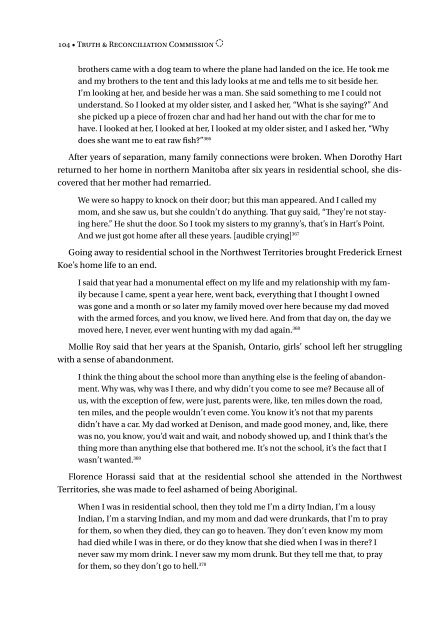The Survivors Speak
1MB8J05
1MB8J05
You also want an ePaper? Increase the reach of your titles
YUMPU automatically turns print PDFs into web optimized ePapers that Google loves.
104 • Truth & Reconciliation Commission<br />
brothers came with a dog team to where the plane had landed on the ice. He took me<br />
and my brothers to the tent and this lady looks at me and tells me to sit beside her.<br />
I’m looking at her, and beside her was a man. She said something to me I could not<br />
understand. So I looked at my older sister, and I asked her, “What is she saying?” And<br />
she picked up a piece of frozen char and had her hand out with the char for me to<br />
have. I looked at her, I looked at her, I looked at my older sister, and I asked her, “Why<br />
does she want me to eat raw fish?” 366<br />
After years of separation, many family connections were broken. When Dorothy Hart<br />
returned to her home in northern Manitoba after six years in residential school, she discovered<br />
that her mother had remarried.<br />
We were so happy to knock on their door; but this man appeared. And I called my<br />
mom, and she saw us, but she couldn’t do anything. That guy said, “<strong>The</strong>y’re not staying<br />
here.” He shut the door. So I took my sisters to my granny’s, that’s in Hart’s Point.<br />
And we just got home after all these years. [audible crying] 367<br />
Going away to residential school in the Northwest Territories brought Frederick Ernest<br />
Koe’s home life to an end.<br />
I said that year had a monumental effect on my life and my relationship with my family<br />
because I came, spent a year here, went back, everything that I thought I owned<br />
was gone and a month or so later my family moved over here because my dad moved<br />
with the armed forces, and you know, we lived here. And from that day on, the day we<br />
moved here, I never, ever went hunting with my dad again. 368<br />
Mollie Roy said that her years at the Spanish, Ontario, girls’ school left her struggling<br />
with a sense of abandonment.<br />
I think the thing about the school more than anything else is the feeling of abandonment.<br />
Why was, why was I there, and why didn’t you come to see me? Because all of<br />
us, with the exception of few, were just, parents were, like, ten miles down the road,<br />
ten miles, and the people wouldn’t even come. You know it’s not that my parents<br />
didn’t have a car. My dad worked at Denison, and made good money, and, like, there<br />
was no, you know, you’d wait and wait, and nobody showed up, and I think that’s the<br />
thing more than anything else that bothered me. It’s not the school, it’s the fact that I<br />
wasn’t wanted. 369<br />
Florence Horassi said that at the residential school she attended in the Northwest<br />
Territories, she was made to feel ashamed of being Aboriginal.<br />
When I was in residential school, then they told me I’m a dirty Indian, I’m a lousy<br />
Indian, I’m a starving Indian, and my mom and dad were drunkards, that I’m to pray<br />
for them, so when they died, they can go to heaven. <strong>The</strong>y don’t even know my mom<br />
had died while I was in there, or do they know that she died when I was in there? I<br />
never saw my mom drink. I never saw my mom drunk. But they tell me that, to pray<br />
for them, so they don’t go to hell. 370


